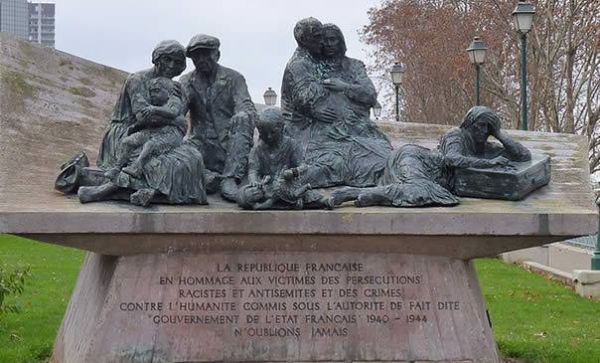The Place of the Vél d’Hiv Roundup in French Collective Memory
On July 16 -17, 1942, over 13,000 Jews from Paris and its suburbs were rounded up by French police in the early morning hours and forcefully taken from their homes to both the Vélodrome d’Hiver, a winter cycling stadium in Paris, and to the Drancy internment camp.
For five days, these men, women, and children – including the elderly, sick, expectant, and even newborns – were held in the most deplorable conditions, deprived of food, water and adequate toilet. They were later deported to Nazi concentration camps, including Auschwitz, with only 811 ultimately surviving the war.
Memory of Vél d’Hiv in Modern Day France
On July 22, 2012, French President François Hollande addressed this difficult national legacy while speaking to a small crowd gathered for a commemoration ceremony at the original site of the demolished Vélodrome d’Hiver stadium. In his speech, Hollande spoke of French complicity in the Shoah and the direct role and responsibility of France in the death of thousands of Jews during World War II.
Shockingly, a study by Le Groupe CSA carried out roughly two weeks prior to Hollande’s speech found that the majority of French citizens under the age of 35 had never even heard of the Vél d’Hiv Roundup. Even more troubling, this percentage was markedly higher among the younger age groups: 67 percent of 15 to 17 year olds; 60 percent of 18 to 24 year olds; and 57 percent of 25 to 34 year olds, had never heard of the Vél d’Hiv. These numbers stood in stark contrast to the group surveyed over the age of 65, among which three quarters were familiar with the roundup.

Memories from the Visual History Archive
Among the 45 relevant survivor testimonials, I noticed several overarching themes. First, the majority of the survivor-witnesses emphasize in their testimonies the “devoir de mémoire” (duty of remembering) – specifically, the expression of the responsibility to remember the Shoah, of bearing witness, as well as the supreme importance that this holds over everything else. Several of the interviewees have expressed the refrain: “Il ne faut pas oublier” (We must not forget) when discussing the Shoah. This often coincides with the expression of the obligation of the survivor to tell as many people as possible about their experiences. Many survivors express concern and anxiety that the Shoah will be forgotten after the passing of the wartime generation. Thus, along with the importance of testimony, survivors also highlight the need for improved Holocaust education programs in France and increased interaction between survivors and schools.
Second, the singularity of the Shoah is another common thread among Vél d’Hiv survivors, specifically the way in which the Jews were targeted simply for existing. As Sarah Montard (author of Chassez les papillons noirs) says in her message to the future generations, “Don’t trivialize the Shoah, it’s quite exceptional – it’s the systematic and scientific elimination of a people solely because they were born.”
Third, several survivors emphasize the importance of fighting back and being vigilant - never “going like sheep to slaughter” again, as Moïse Jankielewicz, puts it. Many survivors express a deep sense of betrayal and loss of trust by the French police and authorities that enforced laws that stripped Jews of their citizenship, rights, and autonomy while later carrying out the series of mass arrests. Several interviewees also emphasize the fact that it was French police, not Germans, who rounded Jews up during the Vél d’Hiv and thus were ultimately responsible for their fate. There is a strong desire among this group that history reflects that French police and gendarmes carried out the arrests, without any German authorities present. Furthermore, responsibility for the deportations and conditions in France is often placed upon Petain and the Vichy government in addition to the Germans. Lazare Pytkowicz, states in his testimony that Petain was the true occupier, not Hitler or the Nazis, and thus Petain was responsible for what happened to the Jews in France.
There is also a compelling amount of anger expressed toward the French, in general, as several interviewees point out that after the war ended, the French wanted to forget their actions during the war period and, thus, there was a prevalent culture of national denial that collaborationism had existed in France. Marionne Paille explains how even her husband (non-Jew) urged her to “forget the past” and “start a new life” – his reasoning being that remembering her experiences during the war was too painful and difficult emotionally.
On the 72nd anniversary of this dark stain in history, we must remind ourselves to never forget what happened and to continue to educate our youth and future generations so that these events never take place again.